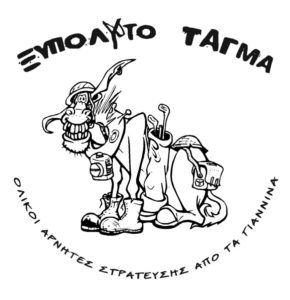From the antimilitarist brochure ‘War Against War’ by the collective of total objectors to military service Xipolito Tagma (‘Barefoot Battalion’ in Ioannina, Greece)
Rapes in wartime can be committed and have indeed been perpetrated by organized armies, paramilitary and fascist groups, and various fundamentalists. Sexual abuse and rapes against girls and women have evolved into a systematic weapon of war and repression. In these phenomena of sexual violence, gender oppression is associated with militarism and the highly patriarchal-structured military corps. It is a common premise, moreover, that just as wars have a gender, the masculine gender, so does the murderous machine of the State, the military. Of course, this doesn’t imply that women are spectators to all this violence; on the contrary, in the majority of cases they are the assault victims.* Women’s rape at war must be seen in the light of the patriarchal organization of national fantasies that are set in operation. The more blatantly patriarchal the national narratives are, the more useful is the weapon of rape for the attackers, and the more exterminating for their targets.
Rape as a means of war may have different origins. In many cases, rape could have been a result of the direct orders of senior army officers, or simply an incentive of the soldiers themselves, or both combined. What’s certain is that these rapes are counted as a component of military victory or defeat, but cannot be exhausted in these connotations. In any case, what gives a meaning–importance to these rapes is a common imaginary: that of ethnic cleansing or otherwise ‘reproductive genocide’, or generally of the destruction of bonds within the adversary society; in other words, first and foremost the destruction of this society’s imaginary significations that are related with the existence of its subjects. During the war in Bosnia–Herzegovina, for example, the pursuit of ethnic cleansing became obvious when women fell victims to mass rape and torture, captivity and forced prostitution by Serb soldiers and paramilitaries. This pursuit was, of course, an explicit command of officers, but it would have no effect without the active involvement of soldiers, nor would it reach such monstrous proportions as it did.
The humiliation and rape of women of the ‘enemy’ in the condition of war acquires the significance of humiliation and rape of an adversary nation as a whole. Obviously, the meanings attributed to women and femininity in general from the nationalist socialization are also intermingled here. Such meanings apply, on the one hand, to the woman’s characterization as the nation’s womb, the one responsible for the nation’s perpetuation (i.e. the birth of nationalists and, why not, willing soldiers), and on the other hand, as the one who must remain chaste, honest and committed to the family, which is the core of the nation. All these features are considered inviolable and self-evident by any nationalism (and any nationalist). Therefore, soldiers rape women and dissolve families of others in order to ‘protect’ their women and families. Woman holds an important role as metaphor, e.g. the ‘mother homeland’ or the aforementioned ‘homeland–nation’s womb’. Women are, thus, something for which a soldier is instructed to go to war (e.g. ‘we go into battle for the sake of our women and children’), an object that exists to be protected (as does the rest of the man’s property). On the other hand, women are the ones who receive the fiercest attacks by the troops, nevertheless are the largest part of civilian population, and most of them uninvolved in the decisions and planning of wars.
Rape at war is not the exception but the general rule that relies on nationalist hatred and male supremacy, the basic elements found in the ideology of the military and warfare. Thus, our antimilitarist stance is based on the universal objection to these elements, always against ‘our’ State and nationalism, but also against male privilege and stereotypes.
* According to official figures, rapes for military purposes were committed in all known wars of recent years: in the former Yugoslavia, Cambodia, Sri Lanka, Bangladesh, Liberia, Peru, Somalia, Mozambique, Sudan and Uganda. The examples given in a draft report of the so-called ‘Committee on Women’s Rights and Equal Opportunities’ of the European parliament are those of Berlin in 1945, when the Allied forces entered the city, and rapes reached 110-800,000; 20-50,000 rapes in the former Yugoslavia during the civil war in the 1990s; and 250-500,000 war rapes in Rwanda in 1994. All of this concerns only estimates and ‘official’ figures, which in fact fail to assess the size of ‘evil’, as in any disaster. Needless to say, rapes have always been—and still are—one of the most powerful and timeless weapons in the hands of the Greek State and nationalism.
http://en.contrainfo.espiv.net/2012/10/31/women-as-spoils-of-war/
